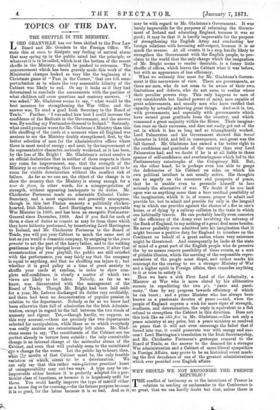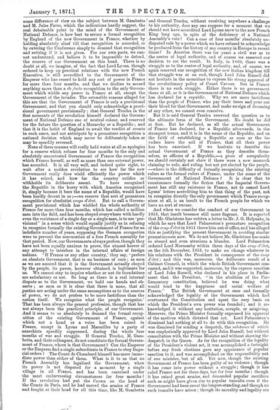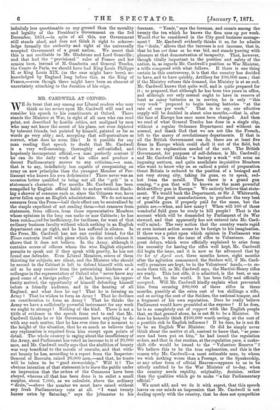WHY SHOULD WE NOT RECOGNIZE THE FRENCH REPUBLIC ?
rritconflict of testimony as to the intentions of France in lation to sending an ambassador to the Conference is so great, that we can hardly doubt but that, unless there is some difference of view on the subject between M. Gambetta and M. Jules Favre, which the indications hardly suggest, the real debateable point in the mind of the Government of National Defence, is how best to secure a formal recognition by England of the new Government in France, whether by holding absolutely aloof till that recognition is accorded, or by entering the Conference simply to demand that recognition and retiring if it is not given. For our own parts, we can- -not understand, and believe it to be impossible to defend, the reserve of our Government on this head. There is no doubt at all, we imagine, of the fact that Lord Lyons, though ordered to keep up practical relations with the new French Executive, is still accredited to the Government of the Emperor who has ceased to hold any sort of power in France for more than four months, and that we decline to accord anything more than a de facto recognition to the only Govern- ment which wields any power in France at all, except the Government of the invader. The ostensible reasons alleged for this are that the Government of France is only a provisional Government, and that you should only acknowledge a provi- sional government provisionally ; that General Trochu in the first moments of the revolution himself declared the Govern- ment of National Defence one of neutral colour, and reserved for the future the question of a Monarchy or a Republic ; and that it is the habit of England to await the verdict of events in such cases, and not anticipate by a premature recognition a national decision which may never be deliberately taken or may be speedily reversed.
None of these reasons will really hold water at all as apologies for a reserve which refuses for four months to the only and absolutely uncontested Government of France the recognition which France herself, as well as more than one external power, has accorded. It is all very well, and indeed quite right, to wait after a sudden revolution to see how far the new Government really does wield efficiently the power which it has seized, and how far the country ratifies or
withholds its deliberate assent. To have recognized the Republic in the hurry with which America recognized it, simply because it bore the name of a Republic, would have been hardly decent in us ;—we reserve that sort of premature -recognition for absolutist coups d'e'tat. But to call a Govern- ment provisional which has wielded the whole authority of France for more than four months, which has called a million men into the field, and has been obeyed everywhere with hardly even the resistance of a single day or a single man, is to use 'pro- visional' in a sense which would equally justify us in refusing to recognize formally the existing Government of France for an "indefinite number of years, supposing the German occupation were to prevent the convocation of a free French assembly for that period. Now, our Governments always profess, though they have not been equally anxious to prove, the utmost horror of any attempt to interfere in the internal affairs of foreign nations. If France or any other country,' they say, prefers an absolute Government, that is no business of ours ; as soon as we are assured that it is the Government actually obeyed by the people, its power, however obtained, is legitimate for us. We cannot stay to inquire whether or not its foundations are satisfactory or not. So long as there is a real internal dispute as to the Government, we hold our hands and ob- serve ; as soon as it is clear that there is none, that all parties are acting under the same assumptions as to the sources of power, we do not profess to be more fastidious than the nation itself. We recognize what the people recognize.' That has been always the general profession, though that has not always been the practical principle, of our Government. And it seems to us absolutely to demand the formal recog- nition of the existing Government of France, against which not a hand or a voice has been raised in France, except in Lyons and Marseilles by a party of anarchists speedily suppressed, during the whole four months of war and struggle. If General Trochu, M. Gam- betta, and their colleagues, do not constitute the formal Govern- ment of France, where is that Government ? Can the Emperor or the Empress find a single subordinate in France to obey Impe- rial orders ? The Count de Chambord himself has more imme- diate power than either of them. What is it to us that no Trench Assembly has legalized the Government, when its power is not disputed for a moment by a single village in all France, and has been exercised under the most embarrassing circumstances for four months ? If the revolution had put the Crown on the head of the Comte de Paris, and he had moved the armies of France and fought at their head for all this time, like M. Gambetta
and General Trochu, without receiving anywhere a challenge to his authority, does any one suppose for a moment that we should not have accredited Lord Lyons anew to the new French King long ago, in spite of the deficiency of a National Assembly's vote ? Can a case of four months' absolutely un- disputed rule by a power which we have refused to acknowledge be produced from the history of any country in Europe in recent times ? In America there was for years a civil war as to the centre of legal authority, and of course we reserved our decision to see the result. In Italy, in 1860, there was a struggle as to the centre of legal authority, and, of course, we again reserved our recognition of the new Italian kingdom till that struggle was at an end, though Lord John Russell did not hesitate in the meantime to express his strong approval of the revolutionary policy of Count Cavour. But in France there is no such struggle. Either there is no government there at all, or it is the Government of National Defence which has declared for a republic. Why we are more fastidious than the people of France, who pay their taxes and pour out their blood for that Government, and make no sign of dreaming of any other, we cannot even conceive.
But it is said General Trochu reserved the question as to the ultimate form of the Government. No doubt he did at first. But he declared, as all the actual Government of France has declared, for a Republic afterwards, in the strongest terms, and it is in the name of the Republic, and on the faith of establishing a Republic as soon as the in- vaders leave the soil of France, that all their power has been exercised. If we hesitate to describe the actual Government of France as they describe them- selves, as officers of a Republic,—a piece of scrupulosity we should certainly not show if there were a new monarch claiming to rule, and ruling, but not yet elected by the people, —where is the difficulty of formally recognizing the existing rulers as the formal rulers of France, under the name of the Government of National Defence ? It is clear that to countenance formally the fiction that the Imperial Govern- ment has still any existence in France, not to cancel Lord Lyons' letters accrediting him to that thing of the past, not to recognize directly the only government which France recog- nizes at all, is an insult to the French people for which we have no sort of excuse.
And when we consider the conduct of our Government in 1851, that insult becomes still more flagrant. It is reported that Mr. Gladstone has written a letter to Mr. J. G. Holyoake, in which he says that Lord Palmerston's premature recognition of the coup d'e'tat in 1851 threw him out of office, and has alleged this as justifying the present Government in avoiding similar prematureness now. We do not believe Mr. Gladstone has made so absurd and even atrocious a blunder. Lord Palmerston ordered Lord Normanby within three days of the coup d'etat, on the 5th December, 1851, to make no change whatever in his relations with the President in consequence of the coup d'etat ; and this was, moreover, the deliberate result of a Cabinet Council, in which the whole British Government con- curred, and it was supported, moreover, by the express sanction of Lord John Russell, who declared in his place in Parlia- ment that the President, "in the abolition of the Par- liamentary constitution, believed he was doing what would tend to the happiness and social welfare of France." The British Government at once and formally acknowledged the legality of the Government which had overturned the Constitution and upset the very basis on which the President's own power was founded ; and it ac- knowledged it without any hesitation, scruple, or misgiving. Moreover, the Prime Minister formally expressed his approval of the motives which dictated that act. Lord Palmerston's dismissal had nothing at all to do with this recognition. He was dismissed for sending a despatch, the substance of which was emphatically approved by Lord John Russell, but without consultation with the Prime Minister and without showing the despatch to the Queen. As for the recognition of the legality of the President's violent act, it was accomplished a fortnight before any fresh elections gave any appearance of popular sanction to it, and was accomplished on the responsibility not of one minister, but of all. Yet now, though the existing Government of France has been guilty of no violence ; though it has come into power without a struggle ; though it has ruled France not for three days, but for four months ; though it has raised great armies, and demanded popular sacrifices such as might have given rise to popular tumults even if the Government had been one of the longest-standing, and though no such tumults have arisen ; though its morality and legality are infinitely less questionable on any ground than the morality and legality of the President's Government on the 3rd December, 1851,—in spite of all this, our Government still stands aloof, and does not think it right to acknow- ledge formally the authority and right of the universally accepted Government of a great nation. We assert that this is not creditable to Mr. Gladstone and Lord Granville ; and that had the "provisional " ruler of France and her armies been, instead of M. Gambetta and General Trochu, the Comte de Paris, we should have had King Louis Philippe II. or King Louis XIX. (as the case might have been), ac- knowledged by England long before this, as the King of France,—even though there might have been an element of uncertainty attaching to the duration of his reign.
































 Previous page
Previous page